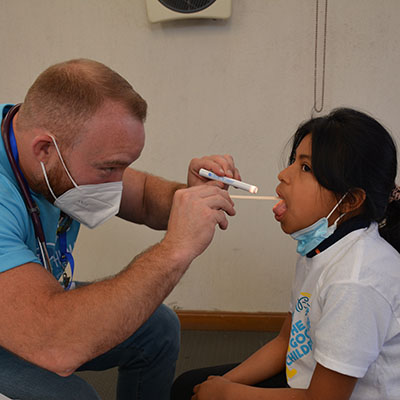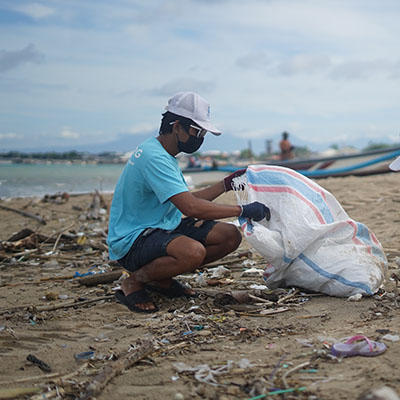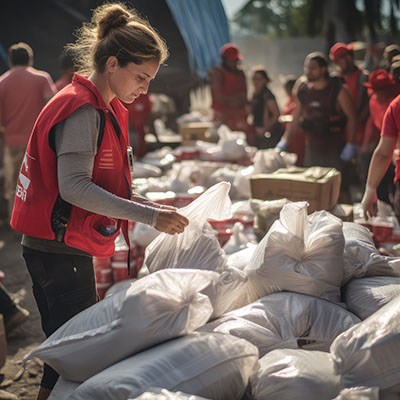Take a moment to think about what you want from life. We wouldn’t be surprised if that list includes the chance to have a positive impact on those around you and the freedom to experience your world in its truest, most authentic form. And since you’re here at Seven Corners, you probably also named the opportunity to travel and see other cultures.
There’s good news: all those things can be accomplished with voluntourism.
What exactly is voluntourism? And what about those who say that volunteering abroad isn’t beneficial to the community you’re trying to help. We can answer these important questions and help you find responsible opportunities available for volunteer travel.
It’s time to take the first step toward ensuring your volunteerism experience is positive for both you and the community.
What is Voluntourism?
Voluntourism is a relatively new phenomenon that combines tourism with global development. As opposed to simple volunteering, where completing a service project is your main objective, voluntouring’s primary goal is travel with a smaller service component.
As a voluntourist, you are a short-term traveler who comes to aid the people or the environment of a place. A voluntourist is by definition a tourist.
What is an example of voluntourism
Building projects — new schools, homes, or hospitals — are some of the most common types of voluntourism projects. They provide instant gratification, after all. When you get there … no house. When you leave … a new home
That’s not the only thing you can do, though. What are the other types of voluntourism?
- Teaching English as a second language
- Arts education and promotion
- Vocational training, including entrepreneurial training for woman and minorities
- Environmental projects such as trail building, tree planting, or trash pickup
- Medical services ranging from first aid to major surgery, translation for medical care, and health education
- Agricultural projects
- Wildlife protection projects such as rehabilitating injured animals or habitat restoration
Can You Volunteer Abroad for Free?
Traveling for free through volunteer work is possible and can be a one-way ticket to just about anywhere abroad. You can join several programs, organizations, or projects that allow you to volunteer abroad for free.
Before signing up for one of these opportunities, it’s important to do your research — more on that in a bit — to make sure your impact will be a positive one and that that program doesn’t sound too good to be true.
Is Voluntourism Doing More Harm than Good?
On the surface, voluntourism sounds like a great deal for everyone. It’s come under scrutiny over the years, however, leaving many to ask if voluntourism is doing more harm than good.
Former Seven Corners blogger Luke Armstrong once wrote, “When I worked for a Guatemala-based charity that hosted 500 annual homebuilders, many of those international volunteers arrived with the same guilt-glazed question: ‘Instead of spending $1,000 to fly across the world to build a house, why not pay someone locally to build more than one house with the money saved from my group's airfare?’"
Other travelers are wondering if their short-term efforts aren’t too short. For example, you might help to build a school, but can the community afford to pay teachers after you leave? You might provide medical care for sick children, but if the community doesn’t have adequate sewage and sanitation systems, shouldn't you also try to tackle that problem as well?
These are disheartening questions that leave many wondering about voluntourism’s negative effects. Don’t be discouraged.
Said Luke: “When charity and volunteerism are done right — wow, friends! In one week, I saw a volunteer nurse a severely malnourished six-year-old with cerebral palsy back to life. In three days, I saw a family of four Americans build a house for a struggling Guatemalan family.
"If the Americans had stayed home and sent money, they could have built three more houses. But by thinking only in sheer numbers, they would have never built the friendship of understanding that blossomed over those three days of building. They would have never fallen into the mutually enlightening relationship that they did.”
Luke shares more of his experiences volunteering abroad in this video.
How to Be a Responsible Voluntourist
Now that we know voluntourism has the potential to be a life-transforming experience for the visited and the visitor, the next question is how we make sure that experience is a positive one for everybody. Here are six ways to be a responsible voluntourist.
1. Decide who you’ll travel and volunteer with.
Whether you’re a planner or prefer someone else to take the lead, there are options for your international service work.
- Fly solo. It takes some effort, but by going solo, you can plan a trip based on the locales and philanthropic causes that interest you most and that are tailored to your strengths. You don’t want to get assigned to an agricultural project when your dream is working with children, after all. If budget is a concern, planning your own voluntourism trip can be a cheaper option. It’s also well-suited to long-term travelers and digital nomads.
- Let someone else handle the details. Working with a voluntourism company is a more expensive option but might be a better bet for short-term travelers or those without much volunteer travel experience. These companies will handle more of the logistics for you, such as finding a project and arranging housing.
- Form your own group. Whether you have a group of family and friends who want to experience travel through service together, or if you’re interested in forming your own volunteer travel organization, group travel is an option that may make some more comfortable while being abroad. Voluntourism can lead to intense culture shock — not only are you in another country but you’re also often removed from the main tourist sites — so having more of a support system might appeal to you.
2. Do your research.
When picking an international service project, make sure to do plenty of research. Not only should you read up on the prominent social, economic, and cultural issues facing your destination, but you should try to find out how international relief efforts have alleviated — or contributed to — those challenges.
Next, learn which voluntourism organizations are providing aid to address these issues. Do these organizations offer volunteer opportunities that align well with your skill set?
When you’ve found a few organizations that could be a good fit, find out their mission, values, and relevant financial information. Most nonprofits share those details on their website or provide them if you ask. If they can’t provide this information, look for a different organization with a reputation you can be confident about.
Here are a few questions to ask before committing to a voluntourism trip:
- Why do I want to volunteer abroad and why did I pick this organization to facilitate my trip?
- What relationship does the organization have with the local community? How does it affect the local economy? How have previous charitable efforts affected the area?
- Are community members involved in the organization’s leadership and decision-making?
- Am I qualified to do this work? If not, will I receive sufficient training?
- What are the long-term impacts of my work?
- Where will my money go? How does the organization manage the funds they receive?
3. Learn how a charity spends its money.
Most charities put out a convincing argument that they are worth your investment of time and resources. To really see what a charity thinks is important, though, find out where it spends its money.
Be wary of organizations that charge large "program fees" as that can be a sign that they’re more concerned about getting your money than your help or labor.
You can also look into how much the director earns and, especially if the organization is headquartered somewhere other than where the work is done, how much of the money goes into the local community.
4. Learn how the organization uses its volunteers.
For a charity, it's normal to put an easy system in place that invites a volunteer to reach out to their network to help them fundraise. We’ve probably all gotten a Facebook invite from a friend’s niece asking us to support a cause.
Because charities know volunteers will help with fundraising, some will mismanage those volunteers, using them to do busy work. If you ever spend your volunteer time abroad doing janitorial or housekeeping work, you are likely not with a very compelling organization. Avoiding this is part of doing your research ahead of time.
5. Study the culture.
Understanding the culture of your volunteer travel destination is an extremely important part of your research. Ensuring you are respectful of your new surroundings will make your stay that much more comfortable for yourself and others. After all, volunteer travel means you’re temporarily in someone else's home, even if the goal is to make that home a better one.
6. Act with respect.
Regardless of where you are in the world, remember that everyone you meet should be treated with courtesy, cultural sensitivity, and respect. In addition to learning a little more about your destination’s culture and social practices, ask the organization you’re traveling with about their guidelines for interacting with locals.
Here are a few ways to ensure that your actions are as well-intentioned as your volunteer project:
- Ask permission before taking photos of anyone, especially children.
- Be sincere in your interactions.
- Remember that people are not tourist attractions.
- Do not touch someone without their permission.
- Understand that some people might not want to engage with you. Respect their wishes.
You also need to think about how you can respectfully talk about your project, particularly when you return from your trip. While you’re volunteering, it’s natural to want to share updates with the folks back home.
Before you post a photo online, think carefully about what you’re communicating. Is your update an accurate, respectful representation of your host culture? Are you promoting harmful stereotypes about the country where you’re staying? Did the subjects of your photo or status agree to have their information shared?
Should You Volunteer Abroad?
The conversations about tourism's impacts are interesting, but the more productive questions are those that ask, "How can I be a better kind of traveler?" Voluntourism can be a better, alternative form of travel.
Grace Lower, another blogger for Seven Corners, reflected on her own experience as a voluntourist.
“The recent controversy around voluntourism has challenged me to consider the impact of my own international service work. While I’m fortunate to have served alongside reputable organizations, I’ll admit that I didn’t put much thought into the ethics and sustainability of my trips. The debate on international service trips has highlighted the value of responsible travel.
“Good intentions are only part of the equation. The best volunteer trips establish a mutually beneficial relationship between volunteers and the communities they serve — and that’s a cause worth supporting.”
Do You Need Travel Insurance for Volunteer Trips?
Voluntourism trips often take you to remote locations. When your destination is difficult to reach or medical care is sparse, protecting your travel plans and your health becomes increasingly important. It's important to get travel insurance that meets your unique needs.
Travel insurance may or may not be required for the country you’re visiting, but it’s highly recommended to ensure safety and financial protection. You want your experience to be a positive one, so making sure you’re covered by travel insurance is one way to maintain peace of mind.
Seven Corners has plans to protect almost any kind of traveler and trip, whether you’re looking for travel medical insurance, trip protection, or travel insurance for a group.
If you aren’t sure what’s right for you, check out our interactive guide. Answer a few simple questions about your travel plans and we’ll recommend the best coverage for your trip. You can also contact one of our expert agents for more.
Travel Like a Pro with The Wayfinder
Did you enjoy this blog? Get more articles like it before anyone else when you subscribe to our monthly newsletter, The Wayfinder.



